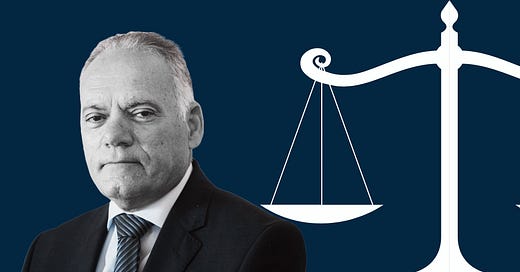New Attorney General announced
At the government's proposal, President Marcelo Rebelo de Sousa appointed Amadeu Francisco Ribeiro Guerra.
What?
On Friday, September 27, President Marcelo Rebelo de Sousa appointed Amadeu Francisco Ribeiro Guerra to be the next Attorney General - a position that has been at the heart of recent political scandals.
He is widely expected to restore trust in this vital position in Portuguese democracy.
Amadeu Guerra, 69, a native of Tábua, began his career more than 40 years ago, having worked in various courts. As a magistrate he rose to Deputy Attorney General in June 2004, and in 2008 he took over the coordination of the Central Administrative Court of the South.
He was director of the Central Department of Investigation and Criminal Action (DCIAP) for six years (2013-2019), during which time he led the investigation into the most serious, complex and organised economic and financial crime, linked to major cases of corruption, money laundering and other white-collar crimes.
Amadeu Guerra took over the leadership of DCIAP in 2013 during Joana Marques Vidal’s term as Attorney General.
The swearing-in ceremony will take place on 12 October at the Belém Palace.
Tell me more
He will succeed Lucília Gago, whose mandate was marred by controversies.
The biggest controversy was over the Influencer case, which led to António Costa’s resignation.
In an interview with RTP in July this year - the first interview since she was appointed to the post - Lucília Gago assumed that the paragraph in the November 7 press note that prompted the PM’s resignation was entirely her responsibility.
However, the prosecutor rejected being responsible for António Costa’s resignation, arguing that the then PM’s decision was “personal and political”.
“The Public Prosecutor’s Office (PGR) did its job and revealed what it had to reveal,” she said.
Gago was also criticised for the actions of the Public Prosecutor’s Office in the Madeira case, which involved the president of the regional government, Miguel Albuquerque.
Three of the defendants in this mega-operation were detained for 21 days in Lisbon on suspicion of various offences. The Public Prosecutor's Office requested pre-trial detention, but the investigating judge released them, considering that there was no evidence of any criminal offence.
These successive controversies have fuelled criticism of the actions of the Public Prosecutor’s Office, with the PGR being accused of interfering in political life and failing to “put the house in order”.
Despite the various criticisms from sectors of political and social life, Lucília Gago has always refused to resign and looks at the mandate that is now coming to an end with “rigour, objectivity and impartiality”.
In the interview with RTP, Lucília Gago said she was “perfectly aware that there is in fact an orchestrated campaign” by people who have or have had “important responsibilities in the life of the nation”, considering that ‘there are many ways to exert pressure’ on the Public Prosecutor’s Office.
The position
The Procuradoria-Geral da República (PGR) of Portugal is a central body within the country’s judicial system, playing a vital role in upholding the rule of law, ensuring justice, and overseeing the work of the Public Prosecutor's Office (Ministério Público).
Its primary responsibility is to safeguard legality, prosecute criminal cases, and represent the state in legal matters.
The PGR is led by the Procurador-Geral da República (Attorney General), who acts as the country’s top prosecutor. This role is typically appointed by the President of Portugal upon the recommendation of the government, and the position is crucial for safeguarding the integrity of the legal process.
While the Attorney General operates independently from the government, they are often involved in significant national legal discussions. The position is apolitical, ensuring that prosecutions and legal interventions are conducted impartially, based solely on the law and the evidence available.
Reactions
A solid name in the structure of the Public Prosecutor's Office, Joana Marques Vidal’s right-hand man - Lucília Gago’s predecessor - but far from a consensus. However, he is seen by his peers as loyal, assertive and discreet.
“He has in-depth knowledge of the Public Prosecutor’s Office, he has the ability to communicate and dialogue with magistrates. It was a good choice,” says Paulo Lona, president of the Union of Public Prosecutors. “He has the necessary profile to perform the job well and has the communication skills to create the necessary bridges between society, the Public Prosecutor's Office and political power,” he added.
The President of the Liberal Initiative, Rui Rocha, expressed his confidence in the choice of Amadeu Guerra: “He is a person who deserves our first vote of confidence to fulfil this mission. [...] He has a past linked to the fight against corruption and seems, from a technical point of view, legally competent.”
Several parties, including far-right Chega, criticised PM Luís Montenegro for not consulting the parties.
Nonetheless, Chega leader André Ventura said it was a “good choice”, giving Chega “guarantees of independent work, impartial work and firm work”.




